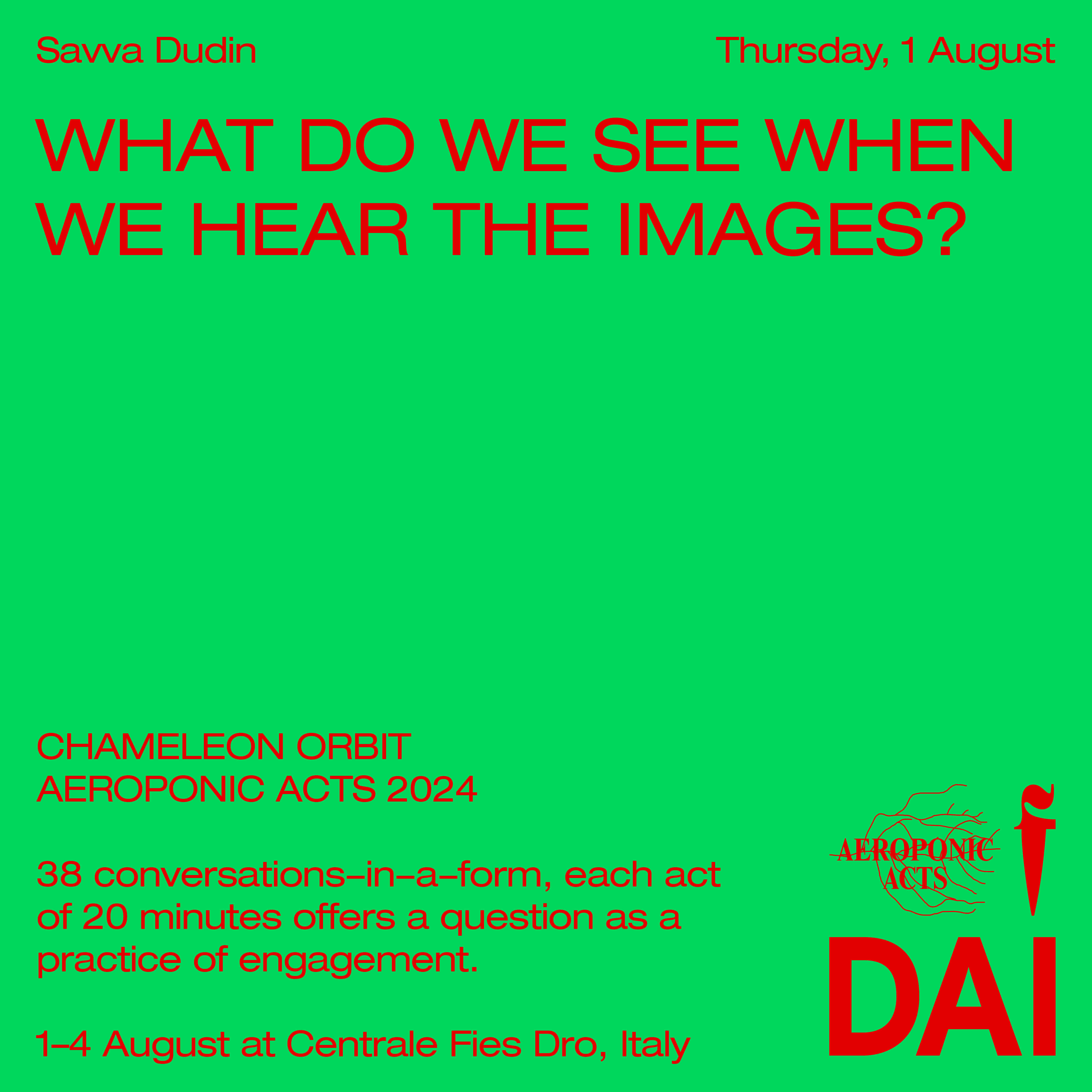Savva Dudin ~ angelic materialists were well aware of that
Savva Dudin's "angelic materialists were well aware of that" was presented before live audience at Centrale Fies, Dro, Italy on August 1, 2024 as one of 38 AEROPONIC ACTS of CHAMELEON ORBIT curated by Elisa Giuliani & Giulia Crispiani.
Here you will find the documentation of Savva Dudin's presentation as filmed by Baha Görkem Yalım. The written report is by Bethany Crawford and it includes a summary of the comments by esteemed guest respondents.
angelic materialists were well aware of that
Savva Dudin's question: What do we see when we hear the images?
Savva's introduction: There, at the dawn of the somber era in the austere mountain landscape a group of honest social scientists gather to reveal the technology that lets you see the images from the right side of history. They assembled shards of the leaked progressive prophecies, which ultimately helps imagine different life in the uncertain times.
Splinters of insights presents angelology, not as a metaphysical game, but as a concrete self-description of material political reality, born out of withdrawal from the space of empire and demonological war principle.
To think of the world as a war between angels and demons is already to practice demonology. Angelic ways of seeing provide a radical alternative to being with the world in war.
Instead of clerical reporting on certain winged creatures, the group will facilitate a workshop that activates agency with attentional exercises for after the end of the history, when the oppressive machines are broken and other machines take shape. So, where is it there?
Bethany's report: At the performance space’s center is a drum kit surrounded by a circle of audience members, setting the stage for a communal experience that combines ritual, humour, and reflection. Performers dressed in white move through the crowd, initiating interactions that range from sincere to subtly ironic. They thank the audience for being there, inviting them into a space where “angel-ing” becomes an embodied practice. Throughout the piece, elements like the gentle drumming, guided bodily movements, and phrases such as "Hello angels" or "We love you" mimic the language of religious gatherings, cults or wellness workshops
The performers frequently address the audience as "angels," creating a semi-sermonic atmosphere that oscillates between sincerity and parody. By adopting the vocabulary and gestures of new-age movements, the performance raises questions about authenticity and faith, but it does so in a way that is neither wholly cynical nor purely celebratory. When the performers refer to “angelic materialists,” a seemingly oxymoronic concept, the tension between transcendentalism and materialism becomes a metaphor for the impossibilities and seemingly contradictory logics that condition our ways of understanding the world. The performers orate to the audience, encourage them to join in with their practices, movements and rituals, whilst weaving references to theoretical texts and philosophical thinking into the performance. Through simple acts, like inviting participants to place their phones on the floor and reflect on their relationship with these devices, the performance asks us to consider both the spiritual weight we assign to our possessions and the mundane utilitarian assumptions we may have of them, exploring how we might interrogate these binarisms that govern our perceptions of the world.
This blend of humor and earnestness cultivates an atmosphere that is at once intimate and expansive. The performers’ use of ritualistic gestures, softly spoken instructions for audience participation in the rituals, and moments of Brechtian disruption—like sudden cymbal crashes—keeps the audience oscillating between absorption and humoured distance. The performance embraces the inherent contradictions in seeking transcendence within a material world, suggesting that such contradictions might not only be inevitable but also part of what makes human experience so rich and layered.
Antonia Majaca: Antonia found the performance refreshingly fun, especially in the context of a long event, as it broke down the barrier between audience and performer, getting people to move and engage. She praised the well-placed dramaturgy, noting how the performance cleverly incorporated references to angelic figures, sparking thoughts of Walter Benjamin and the dramatic qualities of angels in Western art, from Dante to modernist representations. She was struck by the “angel-ing” in the piece, reflecting on the contrast between the performers’ angelic appearance and traditional depictions, like the image of Christ with blonde curls, far removed from the reality of a Middle Eastern Jewish man. She saw this as a playful yet critical take on angelic iconography, de-throning conventional images of angels and opening up new ways of thinking about “angel-ing.”
Antonia also pointed out that angels are the lowest rank in the celestial hierarchy within Abrahamic religions, which led her to think of an essay by Denise Santa Cruz on secularism’s role in the Enlightenment. This, in turn, connected with Ramon’s reference to Sylvia Wynter, as she considered how Western culture has struggled to engage with Latin American and animistic cosmologies, particularly their spiritual dimensions that resist assimilation into materialist frameworks. She noted that “angelic materialism” is an oxymoronic concept, but one with generative potential, as long as it avoids veering into shallow spiritual awakenings, like “white Dutch people crying in a tent on ayahuasca.” Ultimately, she found the performance both thought-provoking and playful, a piece that managed to engage with complex ideas while bringing a sense of joy and energy to the space.
Inti Guerrero: In response to the performance, Inti reflected on its nuanced relationship with language, music, and the aesthetics of wellness and spirituality. He was reminded of John Cage, particularly Cage’s notion of “having nothing to say and saying it,” a concept that resonated with the piece’s balance between conversation and non-conversation. Inti also cited a line by Vietnamese writer Ocean Vuong—"it’s not fair that the word laughter is trapped inside slaughter"—as emblematic of the performance’s exploration of tension and transformation. He noted how the piece borrows from the language and aesthetics of wellness and cult practices, using these familiar forms to create a space of care that felt aligned more with the mystical and supernatural than with evangelism. This approach, he suggested, opened a fictional, almost supernatural portal that was both immersive and effective.
Ramon Amaro: Ramon expressed gratitude for the experience, saying it reminded him of Michel Serres' work on angels, particularly Serres' attempt to “short circuit” monotheistic and polytheistic traditions in understanding messengers. The performance, he reflected, felt like a piece about messages and messengers, prompting him to wonder if Savva had perhaps “solved the new materialist problem.” He saw the work as bringing together the angelic—typically an abstraction—with materialism, which considers everything as matter, suggesting a bridge between these ideas that grounds the angelic in the body.
Ramon found himself with more questions than answers, drawing connections to Sylvia Wynter’s writings on the ceremonial. He noted how, in Western history, the ceremonial transitioned from monarchy to aristocracy and eventually became lost, leaving a void that, in his view, technology has recently filled. However, he felt that Savva’s work did something different: it democratized the experience of the “angelic,” making it an everyday occurrence rather than a transcendental one. He described this as a bold philosophical move, though it also risked treading a thin line between the divine and essentialism.
Ultimately, Ramon saw in Savva’s performance a communal, generational return to the essence of life, love, and laughter. If the divine exists, he suggested, it manifests in laughter, movement, and collective participation. He considered this performance a unique gift, proposing that Savva acts as a messenger, carrying this ethos forward and inviting the audience to explore how far this reimagining of the angelic can go.
About Savva Dudin


